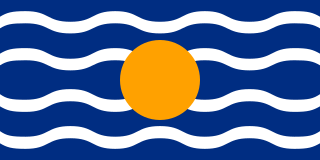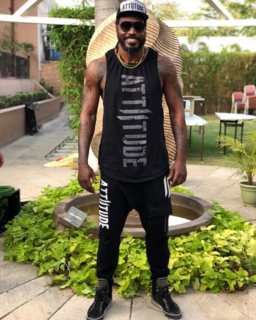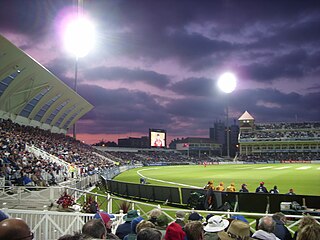
The Danish West Indies or Danish Antilles or Danish Virgin Islands was a Danish colony in the Caribbean, consisting of the islands of Saint Thomas with 32 square miles (83 km2); Saint John with 19 square miles (49 km2); and Saint Croix with 84 square miles (220 km2). The islands have belonged to the United States since they were purchased in 1917. Water Island was part of the Danish West Indies until 1905 when the Danish state sold it to the East Asiatic Company, a private shipping company.

The East Indies, or the Indies, are an archaic term referring to the lands, as the name suggests, east of the Indian subcontinent, most particularly Maritime Southeast Asia and parts of East Asia. In a more strict sense, the Indies were used from a European perspective to refer to the islands of Southeast Asia, especially the Indonesian Archipelago and the Philippine Archipelago.
The 1983 Cricket World Cup was the 3rd edition of the Cricket World Cup tournament. It was held from 9 to 25 June 1983 in England and Wales and was won by India. Eight countries participated in the event. The 1983 World Cup was full of dramatic cricket all through the tournament. Teams like India and Zimbabwe who were not playing well during those times scored victories over the West Indies and Australia respectively. England, Pakistan, India and tournament favourites West Indies qualified for the semi-finals. The preliminary matches were played in two groups of four teams each, and each country played the others in its group twice. The top two teams in each group qualified for the semi-finals.

The West Indies Federation, also known as the West Indies, the Federation of the West Indies or the West Indian Federation, was a short-lived political union that existed from 3 January 1958 to 31 May 1962. Various islands in the Caribbean that were colonies of the United Kingdom, including Trinidad and Tobago, Barbados, Jamaica, and those on the Leeward and Windward Islands, came together to form the Federation, with its capital in Port of Spain, Trinidad and Tobago. The expressed intention of the Federation was to create a political unit that would become independent from Britain as a single state—possibly similar to the Canadian Confederation, Australian Commonwealth, or Central African Federation; however, before that could happen, the Federation collapsed due to internal political conflicts over how the Federation itself would be governed or how it would viably function. The formation of a West Indian Federation was encouraged by the United Kingdom, but also requested by West Indian nationalists.

The British West Indies, sometimes abbreviated to the BWI, is a collective term for the British territories historically established in the Anglo-Caribbean: Anguilla, the Cayman Islands, Turks and Caicos Islands, Montserrat, the British Virgin Islands, Antigua and Barbuda, The Bahamas, Barbados, Dominica, Grenada, Jamaica, Saint Kitts and Nevis, Saint Lucia, Saint Vincent and the Grenadines British Guiana and Trinidad and Tobago. Other territories include Bermuda, and the former British Honduras. Before the decolonisation period in the later 1950s and 1960s the term was used to include all British colonies in the region as part of the British Empire. Following the independence of most of the territories from the United Kingdom, the term Commonwealth Caribbean is now used.

Christopher Henry Gayle, OD is a Jamaican cricketer who played international cricket for the West Indies. Gayle captained the West Indies Test side from 2007 to 2010. Regarded as one of the best batsmen of all time, Gayle has set numerous records across all three formats of the game. He is the most capped player for the West Indies in international cricket and is the only player to score a triplet of centuries – a triple hundred in Tests, double hundred in ODIs and a hundred in T20Is. Gayle is the first ever batsman to hit 1000 sixes in T20 cricket.

Shivnarine Chanderpaul is a Guyanese cricketer of Indian descent and former West Indian international cricketer and captain of the West Indies cricket team. Considered as one of the greatest batsmen of his era, Chanderpaul is the first Indo-Caribbean to play 100 Tests for the West Indies.
Sir Cuthbert Gordon Greenidge is a Barbadian former first-class cricketer, who played Tests and One Day Internationals for 17 years for West Indies. In 2009, Greenidge was inducted into the ICC Cricket Hall of Fame.

The Barbados national cricket team is the national cricket team of Barbados, organised by the Barbados Cricket Association (BCA). Barbados is a member of the West Indies Cricket Board (WICB), which is a member of the International Cricket Council (ICC) in its own right, and Barbadians play internationally for the West Indies cricket team.

Daren Julius Garvey Sammy is a Saint Lucian cricketer who played international cricket for the West Indies. Daren Sammy was born in Micoud, St Lucia to Wilson Sammy and Clara Sammy. He is a two time T20 World Cup winning captain. On making his One-Day International (ODI) debut against Bangladesh in 2004, Sammy became the first person from the island of St Lucia to play international cricket. Three years later he made his Test debut against England, taking 7/66 which were the best bowling figures for a West Indian in his first Test since Alf Valentine in 1950. Sammy was appointed West Indies captain in October 2010. He scored his maiden Test century in May 2012 during a match against England.

The West Indies cricket team, nicknamed the Windies, is a multi-national men's cricket team representing the mainly English-speaking countries and territories in the Caribbean region and administered by Cricket West Indies. The players on this composite team are selected from a chain of fifteen Caribbean territories, which are parts of several different countries and dependencies. As of 10 March 2020, the West Indies cricket team is ranked eighth in the world in Tests, ninth in One-Day Internationals (ODIs) and ninth in Twenty20 Internationals (T20Is) in the official International Cricket Council (ICC) rankings.

The West Indies are a subregion of North America, surrounded by the North Atlantic Ocean and the Caribbean Sea that includes 13 independent island countries and 18 dependencies and other territories in three major archipelagos: the Greater Antilles, the Lesser Antilles, and the Lucayan Archipelago.

Cricket West Indies (CWI), formerly known as West Indies Cricket Board (WICB), is the governing body for cricket in the West Indies. It was originally formed in the early 1920s as the West Indies Cricket Board of Control, but changed its name to West Indies Cricket Board in 1996. In November 2015, the Board resolved to rename itself as Cricket West Indies as part of a restructuring exercise that would also see the creation of a separate commercial body. This rebranding formally occurred in May 2017.

Argopecten is a genus of saltwater clams, or scallops, marine bivalve mollusks in the family Pectinidae.

Day/night cricket, also known as floodlit cricket, is a cricket match that is played either totally or partially under floodlights in the evening. The first regular cricket to be played under floodlights occurred during World Series Cricket, unsanctioned by the International Cricket Council (ICC), attracting large crowds to see some of the world's best players compete in Australia and the West Indies. In 1979, when the ICC and World Series Cricket came to an understanding, the first floodlit One Day International was played, also in Australia. Floodlit cricket has since been played around the world, although England was slow to take it up due to their climate. Floodlit first-class cricket was first played in 1994, when the concept was tried during the Sheffield Shield. Day/night cricket is now commonplace in one-day cricket and Twenty20 cricket. For instance, all 27 matches in the 2014 ICC World Twenty20 were day/night matches, as were most matches in the 2011 Cricket World Cup.

The Battle of St. Kitts or St. Cristopher was a successful Spanish expedition that seized the islands of Saint Kitts and Nevis from the English and French during the Anglo-Spanish War (1625–30).
The West Indies cricket team toured India, Pakistan and Ceylon from October 1948 to March 1949 and played a five-match Test series against the India national cricket team. West Indies won the Test series 1–0 with four matches being drawn. The West Indians played three matches in Pakistan in November and four matches in Ceylon in February.
Jason Omar Holder is a Barbadian cricketer and the current Test match captain of the West Indies cricket team and former ODI captain. Holder made his One Day International (ODI) debut in January 2013 and Test debut in June 2014. In June 2019, Holder played in his 100th ODI match for the West Indies, during the 2019 Cricket World Cup. In January 2019, he was ranked as the number one all rounder in the world according to the official ICC Test rankings. In August 2019, Cricket West Indies named him as the Test Player of the Year.
The Northern India cricket team was an Indian domestic cricket team that competed in the Ranji Trophy between 1934-35 and 1946-47. It played its home matches in Lahore.

Frank Cundall FSA, FRHS, OBE, was an English art historian, editor and author, the son of the writer and publisher Joseph Cundall. He was closely involved in the administration of and produced the reports for a series of international exhibitions held in London in the 1880s, and catalogued the art library at the South Kensington Museum, later the Victoria and Albert Museum.















